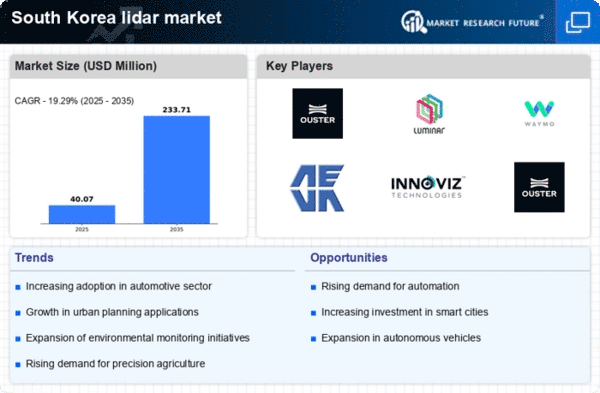Urban Development and Smart Cities
The rapid urbanization in South Korea is fostering the development of smart cities, which significantly impacts the lidar market. Lidar technology is increasingly utilized in urban planning, infrastructure development, and environmental monitoring. The South Korean government has allocated over $1 billion for smart city initiatives, which include the integration of advanced technologies like lidar for efficient resource management. This investment is expected to enhance the accuracy of urban modeling and planning, thereby driving the demand for lidar systems. As cities evolve, the lidar market is likely to see a surge in applications related to urban infrastructure and smart city solutions.
Advancements in Mapping and Surveying
Innovations in mapping and surveying techniques are propelling the lidar market in South Korea. The demand for high-resolution topographic data is increasing across various sectors, including construction, forestry, and agriculture. Lidar technology offers precise measurements and detailed 3D models, which are invaluable for land surveying and resource management. The South Korean surveying industry is projected to grow by 15% annually, with lidar systems playing a crucial role in enhancing data accuracy and efficiency. This trend indicates a robust future for the lidar market, as more industries recognize the benefits of integrating lidar into their operations.
Rising Demand for Autonomous Vehicles
The increasing demand for autonomous vehicles in South Korea is a pivotal driver for the lidar market. As automotive manufacturers strive to enhance vehicle safety and navigation systems, lidar technology emerges as a crucial component. The South Korean government has set ambitious targets for electric and autonomous vehicles, aiming for 1 million units by 2030. This push is likely to stimulate investments in lidar systems, which are essential for real-time environmental mapping and obstacle detection. The lidar market is projected to grow at a CAGR of approximately 25% over the next five years, driven by the automotive sector's need for advanced sensor technologies.
Growing Environmental Awareness and Regulations
The increasing awareness of environmental issues in South Korea is influencing the lidar market. Lidar technology is instrumental in environmental monitoring, including vegetation analysis, pollution tracking, and disaster management. The South Korean government has implemented stricter environmental regulations, necessitating accurate data collection and analysis. As a result, industries are turning to lidar systems to comply with these regulations and improve sustainability practices. The market for lidar applications in environmental monitoring is expected to grow by 20% in the coming years, reflecting the rising demand for precise and reliable data in addressing environmental challenges.
Increased Investment in Research and Development
Investment in research and development (R&D) within South Korea is a significant driver for the lidar market. The government and private sector are channeling funds into developing advanced lidar technologies, which are essential for various applications, including defense, agriculture, and environmental monitoring. In 2025, R&D spending in the technology sector is expected to reach approximately $20 billion, with a substantial portion allocated to sensor technologies like lidar. This focus on innovation is likely to enhance the capabilities of lidar systems, making them more efficient and cost-effective, thereby expanding their adoption across multiple industries.



















Leave a Comment